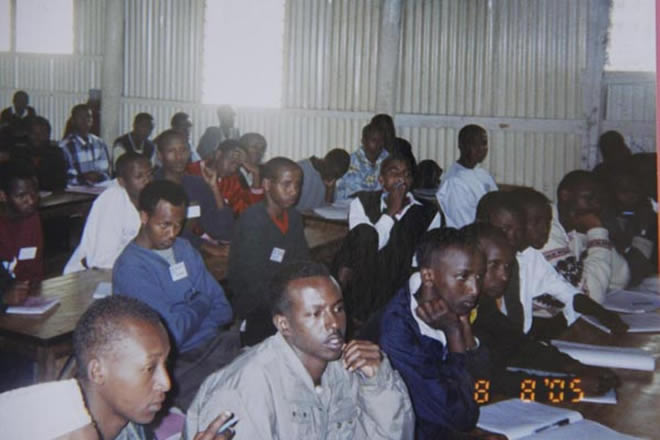
Mohammed Abdirahim Abdullahi (seated 3rd from left) during a lesson when he was a student at Wamy High School in South B, Nairobi.

Wednesday, April 08, 2015
The best education that Mohammed Abdirahim Abdullahi received in his formative years and the strict discipline at his school did not stop him from leading the massacre of 148 people years later.
Abdullahi, the man who led the Al-Shabaab killer squad that raided Garissa University College just two months after celebrating his 27th birthday, has been described by his high school teachers as a genius and a “gifted kid”.
After scoring 283 out of 500 marks in KCPE exams at the Mandera D.E.B. Primary School, he left Mandera County to pursue the rest of his education in Nairobi.
“Indeed, a very obedient and hardworking boy. He can do well and perform better if given an opportunity,” reads his primary school final results slip.
He got the opportunity at Wamy High School, which he joined in 2004 and quickly rose to become among the top-performing students in his class.
“He struggled in the first few months of his first year, largely because he was adjusting to the urban culture and new friends.
“He would adjust quickly and by the time he was in Form Three, he was (at) the top of his class,” Mr Paul Ng’ang’a, Abdullahi’s former Mathematics teacher, told the Nation.
Mr Ng’ang’a is also the deputy principal at Wamy High School, and was, therefore, responsible for Abdullahi’s discipline in the four years the teenager was there.
“The boy was a very active and outstanding member of the Mathematics Club. He also loved football and was active in the field,” he adds, a mixture of pride and perplexity in his eyes.
One of Abdullahi’s former classmates says claims that he could have been radicalised at the school are not only false, but also unreasonable.
“I remember at least 80 per cent of our teachers were non-Muslims. Abdirahim and the other guy known as Atom, who allegedly crossed borders and joined IS, became very good friends after high school. They shared a lot because they both came from the northeastern part of the country.
“I think that was when they became radicalised,” says the friend, whose name cannot be revealed to protect his privacy.
When we visited the school on Tuesday afternoon, we established that only five of its 32 teachers are Muslim, while 27 of the 30 non-teaching staff are Christians.
“So it doesn’t make any sense to even speculate that Abdirahim may have come into contact with radical groups while at the school. Furthermore, he left the school way back in 2007, when radicalisation was unheard of,” says Mr Ng’ang’a.
He was responding to Mandera County Commissioner Alex ole Nkoyo, who suggested that the boy might have had contact with extremists while in school.
Abdullahi’s high school academic record reveals that he lived up to the school’s motto: “Strive to Excel”.
His Form One results slip shows that he was at position five out of 70 students, with a mean grade of A- (minus). He would have scored A were it not for his poor performance in Kiswahili, where he scored a C- (minus).
Wamy High School was established in 2003 and has been among the best-performing private schools. A majority of its students are Muslims.
STELLAR PERFORMANCE
The school was at position 23 nationally in the 2013 Kenya Certificate of Secondary Education examinations.
This stellar performance, Mr Ng’ang’a explains, is because the school is founded upon the Muslim values of strict personal discipline and excellence.
Lethome Ibrahim, a member of the school’s board and a parent at the institution, told the Nation that the institution strives to meet the highest quality standards.
“In fact, quality assurance officers from the Ministry of Education visited the school last year after our stellar performance.
“They checked our curriculum and admission processes and everything came out squeaky clean,” he says.
The school’s mission is to “encourage and facilitate formation of each student’s moral character, unique skill, capacities and creation of strong communal social responsibility”.
“Muslim parents are drawn to the school because of our discipline record and teaching ethic.
“Beyond this, there is nothing particularly Muslim in our curriculum. That’s why (the) majority of our teachers are Christians,” adds the deputy principal.
Ironically, despite the disproportionately large percentage of Christian teachers in the school, only 21 of its current 500 students are Christians. The rest are Muslims.
The school’s website says it was established by the World Assembly of Muslim Youth (Wamy) to enable Muslims to access education.